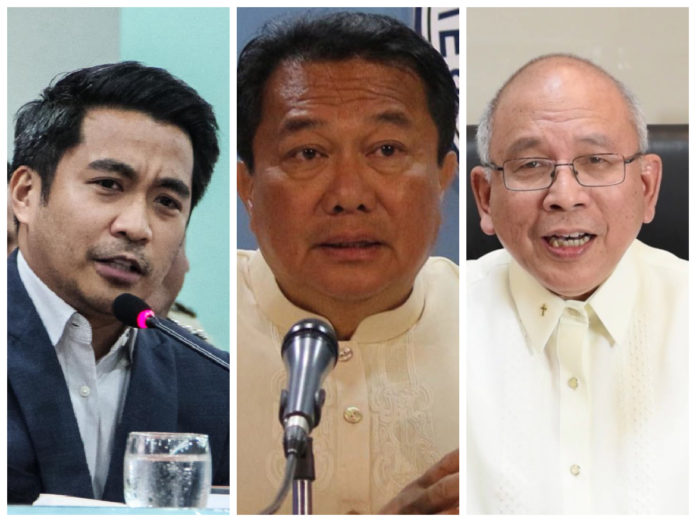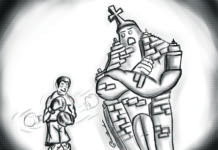
SECTARIAN schools may shut down if the income tax is imposed on religious institutions and schools, because it will increase the cost of education, Catholic education leaders have warned.
On April 10, House Speaker Pantaleon Alvarez bared a proposal to lift the 1987 Constitution’s tax exemption for religious institutions and church-run schools as part of constitutional amendments.
When Congress amends the Charter to shift to a federal system government, lawmakers could look into amending Article 6, Section 28 (3) which mandates that churches and charitable institutions be exempted from taxation.
Fr. Joel Tabora, S.J., president of Catholic Educational Association of the Philippines (CEAP), said imposing taxes on church-run schools would weaken educational operations and services of private and parochial mission schools.
This could force schools to close, Tabora added.
“The schools which contribute education to Filipinos at no major cost to the State, since they operate on private money, are forced to close or are hampered in their desire to improve the quality of their education,” Tabora told the Varsitarian in an e-mail.
There are 351 schools affiliated with religious groups, according to the latest data from the Commission on Higher Education (CHEd).
Lawyer Joseph Noel Estrada, legal counsel of CEAP, said the move would also prompt school fee increases, and the closure of private schools would force the government to build more schools.
“A lot of schools will close and government will be forced to take on responsibility. It will cause the government to put up more schools and to hire more people to operate educational institutions,” Estrada told the Varsitarian.
Article 6, Section 28 in the Constitution states that “Charitable institutions, churches and parsonages, or convents appurtenant thereto, mosques, non-profit cemeteries, and all lands, buildings and improvements, actually, directly and exclusively used for religious, charitable or educational purposes shall be exempt from taxation.”
Section 4 states that all income and assets of non-stock, non-profit educational institutions used for educational purposes shall be also exempted from taxes and duties.
Edmundo Garcia, one of the framers of the 1987 Constitution, said the tax exemption of sectarian schools was placed in the charter to recognize the academic service that the government could not offer to the youth.
“Schools run by religious as well as non-profit, non-stock entities do public service addressing national needs not readily responded to by the inability of the State given competing demands on its finite resources,” he told the Varsitarian.
Garcia added that religious institutions have provided indispensable and “altruistic” opportunities in forming the youth to meet the demands of the country’s growing population.
‘Schools struggle enough’
Estrada, who had worked closely with numerous sectarian schools, said Catholic schools struggle in maintaining the quality of education and facilities.
“It is really a struggle to sustain the operations and much more to maintain a certain quality but quality entails cost. If you don’t have enough resources then you cannot also sustain a certain standard of quality,” he said.
In March 2017, Alvarez took a swipe at church-run schools for tuition hikes.
“`Yung mga ibang private schools mababa `yung tuition pero bakit pinagbabayad natin sila ng tax doon sa income nila sa eskwelahan. Pero bakit itong mga run by religious institutions ang mamahal nung mga tuition fees (sic) tapos libre `yung income tax,” he said in a report on the Philippine Daily Inquirer.
Tabora clarified that while church-run schools were successful in generating revenues, the excess of revenues over expenses were limited and spent to enhance education services.
Estrada said guidelines imposed by CHEd and the Department of Education (DepEd) on tuition increases must allot 70 percent to salaries of teachers and support staff and 20 percent to the improvement or modernization of equipment and facilities.
The Bureau of Internal Revenue (BIR) also aggressively monitors and regulates revenues of schools nationwide, Estrada added.
Revenue Memorandum Circular 64-2016 of the BIR mandates non-stock and non-profit educational institutions to pay internal revenue taxes for income not related to their educational functions.
“If [sectarian schools’ revenues] don’t plow back [to school operations] then it will be taxed. For example, operation of canteens, from its leasing properties, if you cannot prove that it is used for education purposes, it will be taxed,” he added.
A 2014 Pew Research Center report showed countries such as Denmark, Iceland, Spain, San Marino, Italy, Portugal, Switzerland, Austria, Hungary, Sweden, Finland and Germany tax their religious institutions.
But, in the United States, churches are exempted from taxes such as all 50 states in the District of Columbia freed churches from property taxes as reported by Forbes Magazine.





















